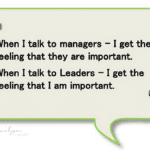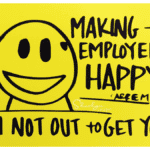Couple weeks ago, I answered a reader question about profanity in the workplace. You can check it out here. In the comments, someone mentioned that profanity could create a hostile work environment. Another person mentioned company guidelines asking for employees to respect one another was a unfair labor practice according to the National Labor Relations Board.
These comments totally caught my interest. So I decided to reach out to one of my labor attorney friends to get some additional insight. Jon Hyman is a partner at the Cleveland-based firm of Kohrman Jackson & Krantz. He focuses his practice on the representation of companies in employment disputes. Workforce Magazine recently named Jon to its editorial advisory board.
So first things first, has the NLRB ruled that “respect for coworkers” is an unfair labor practice?
[Jon] Sadly, it has. First, a little background is necessary. The National Labor Relations Act makes illegal employer rules and policies that employees could reasonably interpret as infringing on their rights to engage in protected concerted activity. To that end, the NLRB has been closely scrutinizing many boilerplate employment policies that regulate workplace speech.

I can see how the ruling makes sense. Employees need to be able to talk about working conditions. So companies cannot limit that conversation. But don’t companies need some sort of “employees need to treat each other with respect” statement?
I’d love to say that employees always treat each other with respect and a policy isn’t necessary. But we both know that’s not the case. Doesn’t the NLRB ruling open the doors for workplace bullying?
[Jon] I think that the NLRB is taking things too far. The NLRB should be reading these employment policies in context to find reasonable interpretations, not imagining a worst-case-scenario by which some employee somewhere could unreasonably interpret a policy as limiting the ability to comment on working conditions.
In a February 4, 2013, Advice Memorandum from the NLRB’s Office of General Counsel, the NLRB stated that ‘potentially violative phrases must be read in context and that it will not find a violation simply because a rule could conceivably be read to restrict Section 7 activity.’ If that statement is true, however, how can the NLRB continue to justify its over-the-top rulings and policy statements on social media and other workplace communications policies?
At the end of the day, employers need to make a choice between a policy statement that limits liability for harassment and creates a workplace where abuse and bullying will not be tolerated, and a neutered policy that might pass muster with the NLRB but leave employers exposed elsewhere. I think the choice is obvious.
You and I started this conversation because of a question about profanity. Can companies ban the use of profanity in the workplace? Should they?
[Jon] Yes, employers can still ban profanity in the workplace. Per the NLRB in its Karl Knauz BMW decision, the employer could have saved its policy by including language clarifying that ‘employee communications protected by Section 7 of the Act are excluded from the rule’s broad reach.’ An employer can also include specific examples to illustrate that the policy does not extend to section 7 activities. Whether employers should ban profanity depends on the nature and culture of the workplace. A school, for example, should have very different standards and expectations as compared to a trucking depot.
I’m not talking about the times when we yell the F-word after slamming our hand in the filing cabinet. But could the regular use of profanity be considered part of a hostile work environment?
[Jon] Usually, salty workplace language, in and of itself, does not create an illegal hostile work environment. The regular use of profanity in the workplace can only be considered part of a hostile work environment if it is directed solely at one protected group to the exclusion of another, or if certain ‘big ticket’ profanities are lobbed at employees. An occasional ‘F-bomb’ likely will not create a hostile work environment. Someone using highly offensive slurs (you know the ones) toward a female employee or an African-American employee even once, however, is often enough to create an unlawful hostile work environment.
In your experience, has Corporate America changed where profanity is concerned? Is it more acceptable now?
[Jon] Corporate America tends to follow our cultural morays (albeit a little more slowly). Thus, to the extend that we, as a society, are more tolerant of off-color language, so is corporate America.
If the use of profanity is a part of a company’s culture, what can they do to make sure they hire people who won’t be offended by it?
[Jon] It is always difficult to gauge one’s ‘fit’ within a corporate culture during the hiring process. You can’t curse out a candidate during an interview to see if he or she can hack the language. Instead, if one’s ability to handle workplace profanity is a legitimate concern, ask questions to determine their tolerance level.
- What are the last five movies you saw?
- What books do you read?
- Do you prefer Bill Cosby or Richard Pryor?
Or, you can just cut to the chase, explain that salty language is part of the workplace, and ask if that poses a problem.
If an employee is upset about the language they hear, what should they do?
[Jon] Talk to management. A company cannot address and fix a problem that it does not know exists. Every company should have an open-door mentality to any complaint an employee might have. Management can then respond accordingly, depending on the nature of the complaint, the language used, and the context in which it was used.
Many thanks to Jon for sharing his expertise with us. If you want to read more of Jon’s insights, be sure to check out his blog, the Ohio Employer’s Law Blog. It’s been recognized by the American Bar Association Journal as one of the top 100 legal blogs for the last three years. And Jon is also the author of the book The Employer Bill of Rights: A Manager’s Guide to Workplace Law.
Are you using the Google Reader service? If so you need to switch: Google Reader is shutting down on 1st July! But fear not — you can easily transfer your favorite feeds to a new service. Check out these alternative options and make the switch now! Or you can sign up to receive HR Bartender directly in your email.








Brad Farris (@blfarris) says
This is a VERY helpful post — thanks so much. I wrote a post about workplace profanity asking some of these same questions a few weeks ago and it got a tremendous response.
http://www.enmast.com/2013/05/swearing-workplace/
It feels like business leaders want to talk about these changes in culture — but aren’t quite sure how to create a standard without being a prude! Thanks for your contribution to the discussion.
Shelley Piedmont @shelley piedmont says
Thank you for providing more information on this. I am always amazed at the NLRB rulings. I would say that as schools have addressed bullying, employers need to as well and having some sort of policy is very important.
Sharlyn Lauby says
Thanks for the comments. I agree – the NLRB ruling appears to be out of touch with the everyday workplace.
Cindy Postanco says
This is so crazy, it’s almost doesn’t make no sense. I am so on the verge of saying that we are taking all the human rights thing too far, but I’m afraid of the reactions.
HR Organizer says
Can’t employers change their policies to something along the lines of “disrespectful/non-courteous behavior is not acceptable. This does NOT include objections to working conditions or forming unions, which are legal rights of employees”?
Jon Hyman says
Yes, employers can change their policies, but must do so carefully. An employee must be able reasonably to read the policy as not restricting the right to collectively talk about wages, benefits, and other terms and conditions of employment. A disclaimer is one way to accomplish this, although the one you suggest probably isn’t broad enough. To be as safe as possible, you’d probably need something like the following:
The Company will not interpret or apply this policy in a way that would interfere with the rights of employees to self organize, form, join, or assist labor organizations, to bargain collectively through representatives of their own choosing, or to engage in other concerted activities for the purpose of collective bargaining or other mutual aid or protection (such as conversations or discussions between or among employees about wages, hours, or other terms and conditions of employment) or to refrain from engaging in such activities.
Greg says
Sounds like another RIDICULOUS Federal regulation: As an employer I can not require employes to be respectful of each other…but I have to have policies in place to insure they respect each other (that limits liability for harassment and states that there will be no tolerance for abuse and bullying).
So I can’t require them to be respectful, but I have to insure they’re respectful via ‘policies’?
So what happens if a disrespectful employee is terminated for a policy infraction? I bet he’d sue for being forced to being ‘required’ to be respectful! Now he has legal standing for this suit!
Jon Hyman says
Greg, you are absolutely right. These NLRB rules are placing well-intentioned employers into a Catch-22 — violate Title VII by not having policies that sufficiently protect employees from the threat of illegal harassment, or violate the NLRA by having policies that do.
www.youtube.com says
I’m curious to find out what blog system you have been using?
I’m experiencing some small security issues with my latest website and I’d like to find something more
safeguarded. Do you have any recommendations?